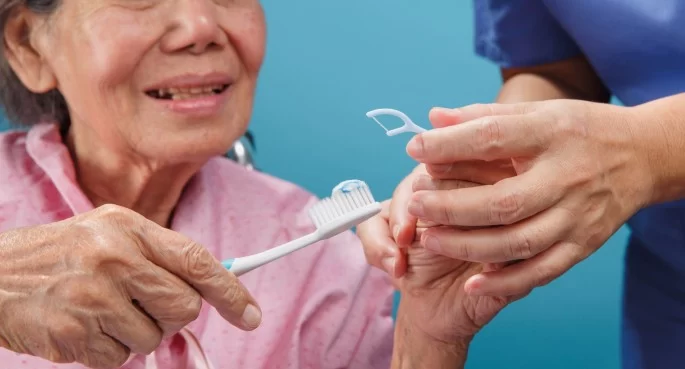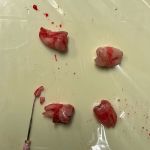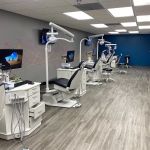
The Impact of Aging on Oral Health and How to Manage It
As I’ve gotten older, I’ve noticed some changes in my oral health that I wasn’t prepared for. At first, it was small things, like slightly more sensitive teeth, but over time, I realized that aging really does affect the health of your teeth and gums in various ways. It wasn’t until I went for a routine checkup and my dentist pointed out some age-related oral issues that I started paying more attention to how aging can impact dental health. Whether it’s dry mouth, tooth sensitivity, or gum disease, there are many ways that the natural aging process can affect your teeth. But the good news is that there are ways to manage these changes and maintain a healthy smile as we age. In this article, I’ll share what I’ve learned about the impact of aging on oral health and how to effectively manage these changes so you can keep your teeth strong and healthy well into your golden years.
1. Dry Mouth and Its Effects on Oral Health
One of the first things I noticed as I got older was an increase in dry mouth. I didn’t realize that it was a common issue for older adults until I talked to my dentist about it. Dry mouth occurs when your mouth doesn’t produce enough saliva to keep it moist, which can happen due to age-related changes or as a side effect of medications. Saliva is essential for washing away food particles and neutralizing acids that can lead to tooth decay, so when you don’t have enough saliva, your teeth become more vulnerable to cavities and gum disease.
After discussing my dry mouth with my dentist, I started using saliva substitutes and chewing sugar-free gum to help stimulate saliva production. Drinking plenty of water throughout the day also helped keep my mouth moist. Another tip that worked for me was using alcohol-free mouthwash, as alcohol can exacerbate dry mouth. Taking care of dry mouth is essential for maintaining oral health because it helps prevent tooth decay, bad breath, and other oral health problems.
2. Gum Disease and Its Connection to Aging
As I’ve learned, gum disease, or periodontal disease, becomes more common as we age. Over time, plaque and tartar can build up on the teeth, leading to inflammation and infection of the gums. Gum disease can start as gingivitis (a mild form of gum disease), but if left untreated, it can progress to more serious forms of periodontitis. When I was younger, I never had issues with my gums, but as I reached my 40s, I started noticing my gums receding a little, which can be a sign of gum disease.
My dentist explained that gum disease is often linked to poor oral hygiene, but it can also be influenced by aging. As we get older, our immune systems weaken, making it harder for our bodies to fight off infections, including those in the gums. The good news is that gum disease can be prevented and managed with regular brushing, flossing, and professional dental cleanings. I also started using a soft-bristled toothbrush and a fluoride toothpaste to help keep my gums healthy, and I made sure to floss every day to remove plaque between my teeth.
3. Tooth Sensitivity and Its Common Causes
Tooth sensitivity became another issue I had to address as I got older. I started noticing that my teeth felt sensitive to hot and cold temperatures, especially when drinking cold water or eating ice cream. Tooth sensitivity is often caused by the wearing down of enamel, which naturally occurs as we age. As enamel thins, it exposes the sensitive layer of the tooth called the dentin, making your teeth more prone to pain or discomfort.
To help manage tooth sensitivity, my dentist recommended using a toothpaste specifically formulated for sensitive teeth. These toothpastes contain compounds that help block the pathways that lead to the nerve inside the tooth. Additionally, I started using a soft toothbrush to prevent further wear on my enamel. I also made sure to avoid overly acidic foods and drinks, as they can further erode enamel and worsen sensitivity. Managing tooth sensitivity requires careful attention, but with the right products and habits, it can be controlled.
4. The Importance of Regular Dental Checkups
As I’ve gotten older, I’ve come to realize that regular dental checkups are more important than ever. My dentist emphasized that routine visits are key for early detection of issues such as cavities, gum disease, and even oral cancer, which can become more prevalent with age. I’ve made it a priority to visit the dentist every six months for cleanings and checkups, as these appointments give my dentist the opportunity to catch any potential problems before they become serious.
Regular dental exams are especially crucial as we age because our oral health needs change over time. In addition to routine cleanings, my dentist also checks for signs of oral cancer, which becomes more common in older adults. Early detection of oral health issues can make a huge difference in preventing further complications, and I’ve found that keeping up with these visits gives me peace of mind that my oral health is in good hands.
5. Managing Dental Work as You Age
As I’ve grown older, I’ve also had to be mindful of the condition of my existing dental work, such as fillings and crowns. Over time, dental work can wear down or become damaged, so it’s important to keep an eye on it. I’ve had a few fillings replaced, and my dentist recommended that I keep an eye on my crowns to make sure they remain intact. One of the challenges of aging is that teeth can become more brittle, making them more susceptible to cracks or chips.
To ensure my dental work stays in good condition, I make sure to avoid habits that can damage my teeth, like grinding them at night. I also avoid chewing on hard objects like ice or hard candies, which can break fillings or crowns. If you have dental work, it’s essential to communicate with your dentist about any concerns you have and to ensure that your dental work is regularly checked during your visits. Proactive care can help extend the lifespan of dental treatments and prevent complications.
6. Diet and Its Impact on Oral Health
Another aspect of aging that I had to address was my diet. I’ve learned that as we age, our dietary needs change, and so do the effects certain foods have on our teeth. For example, I found that eating too many acidic foods, such as citrus fruits and tomatoes, could wear down my enamel. I also became more aware of the sugar content in my diet, as sugar feeds the bacteria that cause cavities.
To improve my oral health, I started incorporating more tooth-friendly foods into my diet. I began eating more dairy products like cheese and yogurt, which are rich in calcium and can help strengthen teeth. I also added more fibrous fruits and vegetables to help clean my teeth as I ate. Drinking plenty of water throughout the day helps wash away food particles and keeps my mouth moist, which is especially important if I’m dealing with dry mouth.
Conclusion: Proactive Care for a Lifetime of Healthy Teeth
As I’ve navigated the changes in my oral health due to aging, I’ve learned that the best way to manage these changes is through proactive care. Dry mouth, gum disease, tooth sensitivity, and the wear and tear on dental work are common issues that can arise with age, but they don’t have to compromise your oral health. By maintaining a good oral hygiene routine, visiting the dentist regularly, being mindful of your diet, and managing existing dental work, you can keep your teeth healthy for years to come. Aging doesn’t mean giving up on a healthy smile—it means adapting to new needs and being proactive in caring for your oral health.







 Paradise Dental Practice5.0 (66 review)
Paradise Dental Practice5.0 (66 review) Russo Family Dental4.0 (16 review)
Russo Family Dental4.0 (16 review) Madison Oral Surgery & Dental Implants4.0 (661 review)
Madison Oral Surgery & Dental Implants4.0 (661 review) LAX DENTAL and ORTHODONTICS4.0 (107 review)
LAX DENTAL and ORTHODONTICS4.0 (107 review) Crimsoncare Family Dental5.0 (248 review)
Crimsoncare Family Dental5.0 (248 review) Kids and Teen Dental Place4.0 (523 review)
Kids and Teen Dental Place4.0 (523 review) The Importance of Oral Health Education During Pregnancy for a Healthy Pregnancy
The Importance of Oral Health Education During Pregnancy for a Healthy Pregnancy Best Tips for Brushing Your Teeth Properly for Healthy Gums: Essential Techniques for Oral Health
Best Tips for Brushing Your Teeth Properly for Healthy Gums: Essential Techniques for Oral Health Why Skipping Dental Checkups Can Lead to Bigger Oral Health Problems
Why Skipping Dental Checkups Can Lead to Bigger Oral Health Problems Advantages of Porcelain Dental Restorations
Advantages of Porcelain Dental Restorations How Can Diabetes Cause Tooth and Gum Problems? Preventing and Managing Oral Health Issues
How Can Diabetes Cause Tooth and Gum Problems? Preventing and Managing Oral Health Issues Healthy Habits for Promoting Good Oral Health and Hygiene: Tips for a Healthy Smile
Healthy Habits for Promoting Good Oral Health and Hygiene: Tips for a Healthy Smile